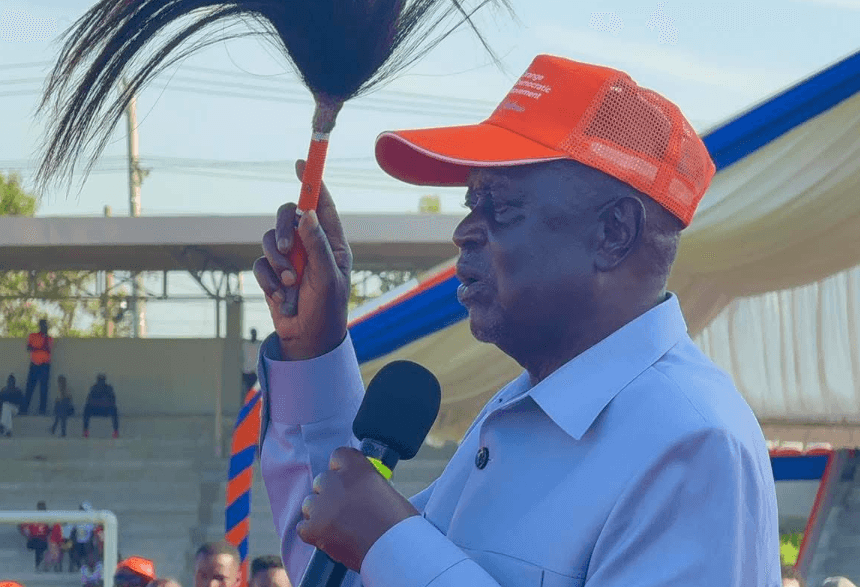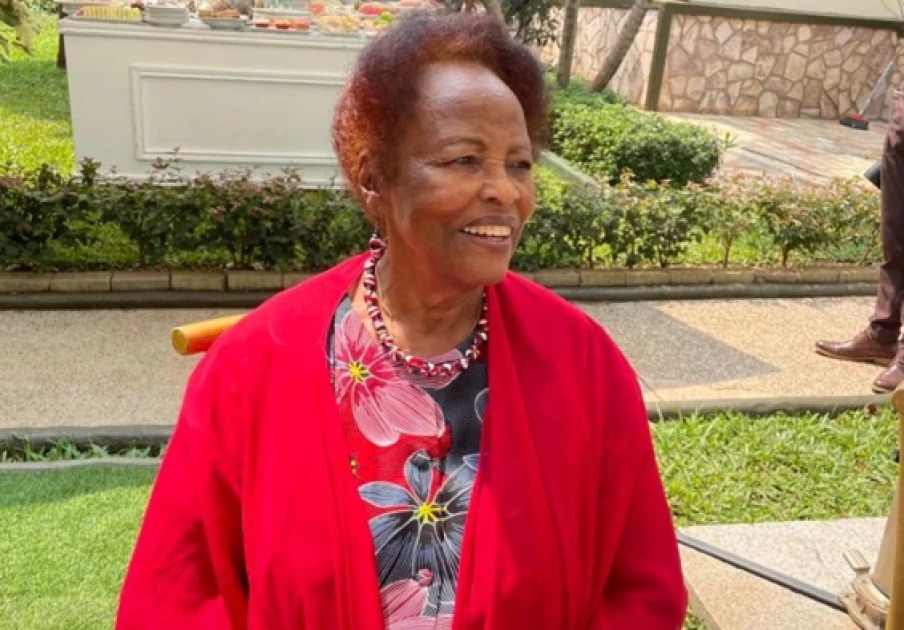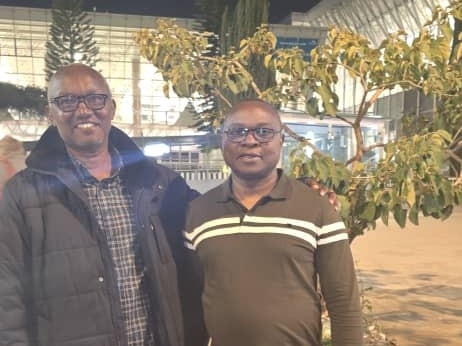Adolescent pregnancy has for a long time remained a major contributor to maternal and child mortality in Kenya.
Young girls aged 15 to 19 years old in many cases have often been victims of early pregnancy, and the age bracket has reduced to as little as 10 years old.
This has not only led to young girls dropping out of school but also stigma and rejection from the community.
Girls are also bedevilled with HIV infections and gender-based violence, completing a set of barriers that have been dubbed Triple Threat.
Tinta Juma, 17, got pregnant at the age of 16, when she was in Class 8. Speaking during the National Dialogue in Mombasa on Thursday last week, she recounted her challenges growing up.
“I grew up under the care of my parents but we went through hardships, especially in my education, but my uncle supported me by buying me books whenever my mother could not afford,” she said.
“I remember our house one day caught fire when I was in Class 3. I was so worried because I did not know what would happen next, but due to my good class performance, I was lucky to get a sponsorship programme from a well-wisher.”
Juma, who was always at the top in her academics, started dating when she was in Class 5 because of the poor life her family was living.
“I started engaging in relationships because sometimes I could go home and find there was no food,” she said.
“Sometimes my parents could not provide for my basic needs due to their poor financial status. I used to get whatever I needed in my relationships but unfortunately, I got pregnant when I was in Class 8.”
Juma got pregnant during the long holiday caused by the Covid-19 pandemic, but she was so afraid to disclose it to her parents.
She later opened up to her mother, who informed her father.
Singi Mapenzi, a young girl living with HIV, also shared her experience at the event, which was convened by the National Aids Control Council (NACC) and the National Council for Population and Development (NCPD) at English Point Marina hotel.
Mapenzi was born with the disease but no one told her until she was 13 years old.
“I lost my mother when I was young. I was brought up by my aunt, who never told me about my status. I used to take drugs but every time I asked, she could tell me I have chest problems,” she said.
One day, her neighbour asked her if she was aware of the type of drugs she was taking.
“When my neighbour asked me about the drugs, I went to my clinic doctor for inquiry. The doctor told me the truth and gave me hope that using the drugs was not the end of my life,” Mapenzi said.
Upon asking her aunt, she told her she never wanted to disclose it to her because she did not know how she would react.
Singi, who was later forced to drop out of school due to financial struggles, said her friend introduced her to sex work, where found herself pregnant after the first encounter.
“My friend convinced me that if I accept the work, I will get money for my upkeep. That is how I became a sex worker, and that is how I also got my first child. I do not know the father of my child,” she said.
We have cases where there has been exchange of camels and cows when a child is raped and probably infected. We are not going to tolerate this
CAUSES AND EFFECTS
In Kenya, teenage pregnancies have always been blamed on poverty, which plays a big role where girls engage in relationships to provide for their families.
The nation recorded a high number of teen pregnancies during the Covid-19 surge, which led to the closure of schools.
Coastal regions were among the most-affected areas. Cultural practices were pointed out to be the main causes of early pregnancy.
Some communities still promote early marriage and in case a young girl gets pregnant, parents prefer marrying her off in exchange for wealth.
Other parents marry off their children due to fear of the unknown from the community, and this is due to the lack of enough information among both parents and the young girls.
This has not only resulted in early teen pregnancy cases but also new HIV infections.
Interior CS Fred Matiangi was the keynote speaker at the event, which was attended by eight regional commissioners and the 47 county commissioners to develop strategies for the 'End Trip Threat' campaign.
He said night vigils, also known as ‘disco matanga’, have highly contributed to early pregnancy cases.
His Health counterpart Mutahi Kagwe had initially banned the night vigil as a way to curb the spread of Covid-19. Matiangi said the law is still active, despite people going back to their normal way of living after the lifting of Covid-19 measures.
“The administrative action of banning disco matanga, which helped us reduce the numbers in Kilifi county, is the one we need to carry out across the country,” he said.
“We should discourage this because young girls drop out of school through such occasions. It is time to look at cultural practices that are not helpful and fight them to end the menace.”
He said on some occasions, chiefs have been involved in kangaroo courts, where livestock is used to settle defilement cases.
“We have cases where there has been exchange of camels and cows when a child is raped and probably infected,” the CS said.
“We are not going to tolerate exchange of life with camels. We are not going to reduce the lives of our girl child to the primitive level of exchanging their lives with the lives of animals.”
He said any chief administrator found to be involved will be dismissed because Triple Threat is a serious issue, which should be dealt with seriously.
Juma, who has not gone back to school after getting her child, said her parents, who were angry when she told them the truth, reported the matter in court.
“My parents were very mad at me when I opened up to them. The person responsible was arrested but later released on a bond. The case is still in court and I hope I will get justice with my child,” she said.
She still has hopes that one day, she will go back to school.
New HIV infections, early pregnancy and gender-based violence among young girls are slow killers that are slowly robbing us of the most important aspect of our lives, which is human resource
WAY FORWARD
NACC and NCPD have partnered with the National Government Administration Officers and the Media Council of Kenya to come up with the ‘Triple Threat’ programme to tackle teen pregnancy, GBV and new HIV infections.
NCPD director general Mohammed Sheikh said 30 per cent of the Kenyan population are youth, many of whom are facing these problems.
“Issues of population cannot be addressed by one institution. It should be taken holistically because these are things that happen at home and in our household,” he said.
“That is why we have partnered with the Ministry of Health in one government approach to address issues of population and development.”
NACC chief executive officer Ruth Laibon said many people fear talking about sex and violence among young girls. And for the matter to be addressed, it needs leadership that is bold and a united government that speaks from the same space.
“We need to harness the leadership of our nation to reach all parts of the country,” she said.
“We have a platform that cannot be bought with money, and that is human resource. If this platform is enriched with passion, commitment and accountability, we can rest assured that this challenge will be tackled.”
Matiang'i said his administration is going to work closely with the partners involved because Triple Threat is just like security challenges like drug peddling.
“New HIV infections, early pregnancy and gender-based violence among young girls are slow killers that are slowly robbing us of the most important aspect of our lives, which is human resource,” he said.
“We may fight crime while at the same time we are slowly bleeding, slowly haemorrhaging and losing young people to Triple Threat.”
He said the challenge needs to be addressed lest the country loses out in the long run.
The CS said there is no way the government will achieve the Big 4 agenda and Vision 2030 if it is not effectively putting in efforts where they are most needed.
“From now onwards, we are going to mainstream Triple Threat as part of our national administration functions,” he said.
“Starting next quarter, we will develop a time of reporting on the matter so that as we receive the security threat report, we also get a Triple Threat report from every county.”
He said his administration will train people involved in the exercise, including chiefs and Nyumba Kumi, on how to handle and reduce the issues.
“We will translate the county and regional commissioners into Transformation of Training officers and facilitate them alongside our usual support for them to train our structures downstream,” he said.
Matiangi said this will help every person on the ground to know how to collect and detect data and how to continue campaigning hard against Triple Threat.



















